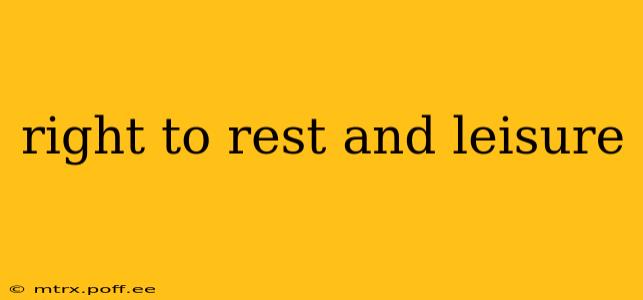The right to rest and leisure is a cornerstone of human dignity and well-being, often overlooked amidst the hustle and bustle of modern life. It's not simply about relaxation; it's a fundamental human right that contributes significantly to physical and mental health, social justice, and overall societal progress. This right is enshrined in international human rights law, emphasizing its importance for a fulfilling and equitable life. Let's delve deeper into this crucial aspect of human rights.
What is the Right to Rest and Leisure?
The right to rest and leisure isn't just about taking a break; it's about having the time and opportunity to engage in activities that promote relaxation, rejuvenation, and personal enrichment. It encompasses several key aspects:
-
Reasonable working hours: This includes limitations on overtime, ensuring sufficient rest periods between work shifts, and paid holidays. Overwork can lead to burnout, health problems, and decreased productivity. The right to rest and leisure ensures a balance between work and personal life.
-
Paid holidays: Regular paid time off allows individuals to recharge, spend time with loved ones, and pursue personal interests without the financial burden of unpaid leave. This is essential for preventing burnout and maintaining a healthy work-life balance.
-
Safe and healthy working conditions: A stressful or unsafe work environment negates the possibility of genuine rest and leisure. Workers need an environment that fosters well-being and doesn't impede their ability to relax and recharge outside of work.
What International Instruments Guarantee This Right?
The right to rest and leisure is prominently featured in several international human rights instruments, solidifying its status as a fundamental right:
-
Universal Declaration of Human Rights (UDHR): Article 24 explicitly states the right to rest and leisure, including reasonable limitation of working hours and periodic holidays with pay.
-
International Covenant on Economic, Social and Cultural Rights (ICESCR): Article 7 further elaborates on this right, highlighting the importance of paid holidays and reasonable working hours.
How Does the Right to Rest and Leisure Impact Society?
The societal impact of respecting the right to rest and leisure is profound:
-
Improved health and well-being: Adequate rest and leisure contribute significantly to physical and mental health. It reduces stress, improves sleep, and boosts overall well-being.
-
Increased productivity: Workers who are well-rested and have time to recharge are more productive and efficient. This benefits both the individual and the employer.
-
Reduced social inequality: Ensuring access to rest and leisure for all, regardless of socioeconomic status, is a crucial step towards reducing social inequality and promoting a more just society. Access to parks, recreational facilities, and paid time off shouldn't be a privilege but a right.
How is the Right to Rest and Leisure Implemented?
The implementation of the right to rest and leisure varies across countries, depending on their legal frameworks and socio-economic conditions. However, effective implementation generally involves:
-
Strong labor laws: Legislation that sets limits on working hours, mandates paid holidays, and protects workers' rights is crucial.
-
Effective labor inspections: Regular inspections ensure compliance with labor laws and protect workers from exploitation.
-
Social dialogue: Involving workers and employers in discussions about working conditions and rest periods fosters a collaborative approach to promoting the right to rest and leisure.
What are the Challenges to Realizing This Right?
Despite its legal recognition, numerous challenges remain in fully realizing the right to rest and leisure:
-
Long working hours: Many individuals work excessive hours, often without adequate compensation or rest.
-
Job insecurity: The fear of job loss can prevent workers from taking breaks or asserting their right to rest.
-
Lack of access to recreational facilities: Unequal access to parks, recreational facilities, and other leisure opportunities disproportionately affects marginalized communities.
-
Globalization and technological advancements: The increasing interconnectedness of the global economy and rapid technological advancements can blur the lines between work and personal life, making it difficult to disconnect and truly rest.
Is Rest and Leisure a Human Right for Everyone?
Yes, the right to rest and leisure is a universally recognized human right, applicable to everyone, regardless of their occupation, social status, or any other differentiating factor. International human rights law affirms this right for all individuals.
How Can We Better Protect the Right to Rest and Leisure?
Protecting this crucial right requires a multi-faceted approach involving governments, employers, and individuals. This includes strengthening labor laws, promoting a culture that values work-life balance, and advocating for policies that ensure equitable access to leisure opportunities for all. Ultimately, respecting the right to rest and leisure is an investment in a healthier, more productive, and more just society.
